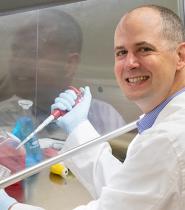
About
Research Interests
My research centers on immune regulation of microbe-immune interactions, and how this relationship relates to autoimmune diseases such as inflammatory bowel disease, multiple sclerosis, and systemic lupus erythematosus.
Research Details
My current research involves characterization of the role regulatory T cells play in shaping immune responses to self-antigens and microbiota antigens of the extended self. My lab is approaching this question through the development of the novel in vitro models of microbe-immune interaction. My previous research has spanned numerous areas including 1) utilization of genetic tools to develop innovative mouse models to study the role of self-antigen and microbiota-driven autoimmunity, 2) the role of vitamin D in autoimmune disease, and 3) B lymphocyte development and genetic dissection of B cell-mediated autoimmunity. In the classroom, I seek to engage and energize my students both by incorporating active learning and student-centered approaches and with an enthusiastic and passionate attitude toward learning. I also enjoy training young scientists in the lab and utilize my research as another opportunity to promote inquiry-based learning.
-
X. Chen and Mayne C.G. The role of micronutrients in graft-vs.-host disease: immunomodulatory effects of vitamins A and D. Frontiers in Immunology. 2018 Dec 6;9:2853-2860.
-
Jeschke J.C., Mayne C.G., Ziegelbauer J, DeCiantis C.L., Singh S., Kumar S.N., Suchi M., Iwakura Y., Drobyski W.R., Salzman N.H., Williams C.B. A model of TH17-associated ileal hyperplasia that requires both IL-17A and IFNγ to generate self-tolerance and prevent colitis. Mucosal Immunology. 2018 Jul;11(4):1127-1137. *Article and artwork featured on cover
- Spanier J.A., Nashold F.E., Mayne C.G., Hayes CE. Vitamin D and estrogen synergy in Vdr-expressing CD4+ T cells is essential to induce Helios+FoxP3+ T cells and prevent autoimmune demyelinating disease. J Neuroimmunology. 2015 Sep 15;286:48-58.
- Mayne, C.G., Williams, C.B. Induced and natural regulatory T cells in the development of inflammatory bowel disease. Inflammatory Bowel Diseases. 2013 Jul;19(8):1772-88.
- Mayne C.G., Spanier J.A., Relland L.M., Williams C.B., Hayes C.E. 1,25-Dihydroxyvitamin D3 acts directly on the T lymphocyte vitamin D receptor to inhibit experimental autoimmune encephalomyelitis. Eur J Immunol. 2011 Mar;41(3):822-32.
- Hayes, C.E., Nashold F.E., Mayne C.G., Spanier J.A., and Nelson C.D. 2011. Vitamin D and Multiple Sclerosis. Vitamin D, Third Edition. Ed. by Feldman, Pike and Adams. Acad Press.
- Mayne, C.G., Amanna, I.A., and Hayes C.E. BAFF-Receptor residues 168-175 are essential for optimal CD21 expression but dispensable for B cell survival. Mol Immunol. 2009 Dec;47(2-3):590-9.
- Mayne, C. G., F. E. Nashold, Y. Sasaki, and C. E. Hayes. Altered BAFF-receptor signaling 4nd additional modifier loci contribute to systemic autoimmunity in A/WySnJ mice. Eur J Immunol 2009 39:589-599.
- Mayne, C. G., I. J. Amanna, F. E. Nashold, and C. E. Hayes. Systemic autoimmunity in BAFF-R-mutant A/WySnJ strain mice. Eur J Immunol 2008 38:587-598.
